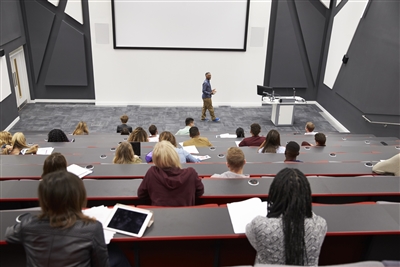Further education increases the risk of short sightedness

A study conducted by the School of Optometry and Vision Sciences at Cardiff University, and recently published in the British Medical Journal, makes an astonishing claim. The longer you spend in education the greater chance you have of developing myopia. Put in simple terms, this means that the more time you spend at school or university, the greater the chances are that you will need to wear glasses.
Professor Jez Guggenheim, who was involved in the study, was quite frank about the link between schooling and short sightedness:
`Our study provides strong evidence that length of time spent in education is a causal risk factor for myopia.`
`Policymakers should be aware that the educational practices used to teach children and to promote personal and economic health may have the unintended consequence of causing increasing levels of myopia and later visual disability as a result.`
Since there is a known link between severe myopia and loss of sight, the result of the study allows this astonishing statement to be made: the more time you spend in education, the more likely you are to go blind.
The study also predicts the rate of ocular deterioration, and actually says that if a student has 20/20 vision at the age of 16, by the time they graduate from university they might well need glasses to legally drive.
Ask people what they think an intelligent person looks like, and they will probably describe a range of physical characteristics. Tall, thin, perhaps wild unruly hair might be amongst the characteristics cited - but most people will say the person wears glasses. The bespectacled boffin is a of course a cliche - one that features prominently in movies.
Woody Allen, the intelligent, neurosis ridden character, can hardly be imagined without his thick black spectacles. Dr. Egon Spengler, the smart one out of the four ghostbusters, is another glasses wearer; and of course superman has to do little more than put on his spectacles to become the nerdy, anodyne Clark Kent.
The cliche continues into the world of cartoons: Velma from Scooby Doo - is the only character in the show wearing glasses, and the only character, so it seemed to me as a child, possessing a modicum of sense. Professor Frink and Professor Farnsworth, from the Simpsons and Futurama respectively, sport eyeglasses so thick as to be completely opaque. Millhouse, another Simpsons character, and the archetype nerd, wears glasses throughout the show; and Chuckie, the timid brainiac from Rugrats wears spectacles from infancy.
It`s certain a hackneyed cliche that glasses wearers are more intelligent than those with perfect vision, but the Cardiff study suggests that myopia can be caused by long hours spent staring at text on screens, and scrutinising textbooks. With the growing prevalence of phones and tablets in people`s lives, surely today our eyesight is under greater strain than ever. It is estimated that by 2050 as much as half the world`s population, around 5 billion people, will be short sighted, compared to 1.4 billion people today; and about 10% of them will suffer from severe myopia, a condition that can lead to blindness.
Though many might doubt the link between education and eyesight problems, one only has to look at countries like South Korea, China and Singapore - places that have an intense teaching schedule, including longer school hours, and evening study classes - where about 90% of students leave school at 18 with glasses. At the end of primary school as many as half of children in these countries suffer from myopia, compared to just 10% of British school children.
The authors of the study were not too forthcoming in offering solutions to this problem. Other than saying children should be spending more time outdoors, they didn`t offer any practical methods of dealing with their rather dire predictions. Outdoor lessons may sound like a lot of fun - children out in the fresh air, surrounded by nature - but it really would be a logistical nightmare. As an ex teacher myself, I can testify to the necessity of having a class surrounded by four walls. Goodness knows how many children would be wandering off into the undergrowth during a taxing maths or English lesson.
The study was certainly an extensive one, involving nearly 68,000 men and women who were registered with the UK Biobank programme. Drawing on a wealth of information, such genetic markers linked to myopia, and the amount of time subjects had been in education, the study concluded that more time spent in education leads to a `rising prevalence of myopia.`
I have read through the study, and confess that it is a little too technical for me. I do wonder how anyone can ascertain a `genetic predisposition to higher levels of education,` but I must bow brighter minds than my own. Perhaps the study will have ophthalmologists around the country rubbing their hands in glee, but we certainly should not let it be used as a tool to detract from the importance of education.

 Add a Comment
Add a Comment